Chocodiles (History, Pictures & Commercials)
If you love Twinkies, you might have dreamt of being able to enjoy them with a chocolate coating on the outside. What you might not be aware of is that you actually can get this classic snack with a chocolate coating! The company that made twinkies realized that this was a common request and they created the Chocodiles product to make sure that you could actually enjoy this kind of treat if you wish.
Chocodiles is one of the lesser-known of Twinkie product options that are out there but for those who do know about its existence, it is a favorite. There are so many reasons that you will love this snack and if you have never tried Chocodiles, you need to be sure to put this confectionery item on your list of sweets to fall in love with.
Please leave a review or any memories of this snack in the comments at the bottom of this page. Thank you!
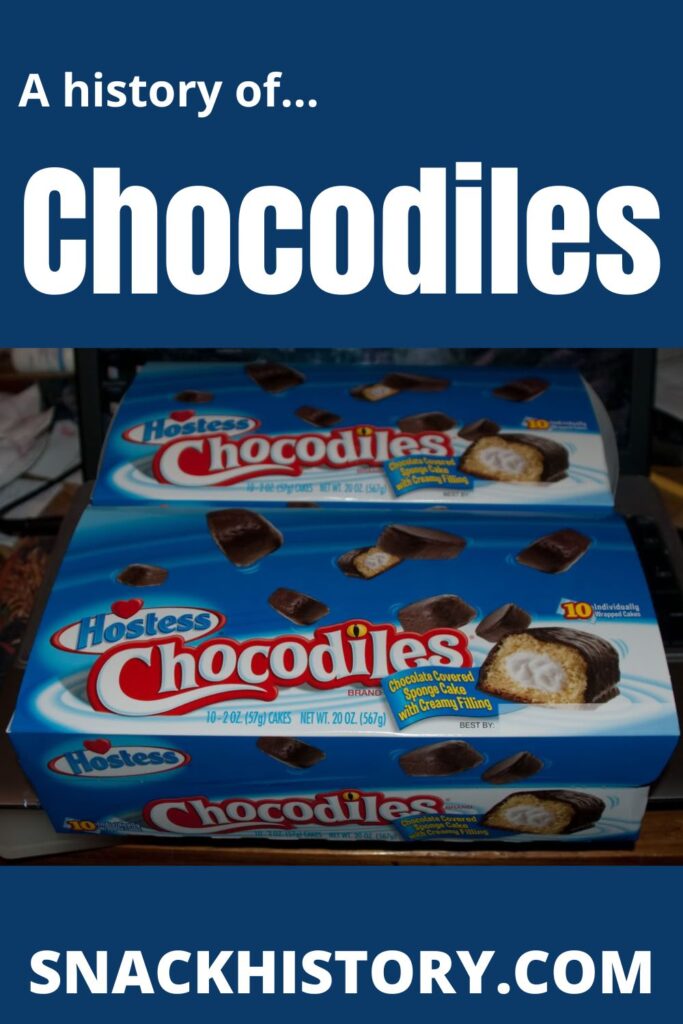
History
Chocodiles are made by Hostess Brands. They were only known under this name prior to 2014. Today the full-sized version is sold under the branding of, “Fudge Covered Twinkies” which is much less interesting and exciting. However, this does explain what the Chocodile is for those who have yet to discover them.
The sweet also comes in a fun-size cake at 1.45 oz, while the original cakes were 2 oz at this same portion size. They are also referred to as Chocodile Twinkies in advertising, no matter the size of the product. This can cause some confusion about what one is buying, but you can rest assured that if it is a Twinkie and there is chocolate on it, it is a Chocodile.
The Twinkie, which is at the center of a Chocodiles bar is one of the most well-known snack foods in the US and arguably one of the best-known treats around the world. Popularized in TV and movies, this snack has been well-known for its sweetness and fluffy texture for generations. The cream-filled center of the Twinkie is something that is carried over into a lot of the other products in the Hostess Company lineup and this is one of the main attractions to the Twinkie Bar.
These cakes hold up for forever as well, which prompted a lot of speculation among health experts in the 90s that the Twinkie, just like McDonald’s burgers, was not really a real food item. Just because a product does not go bad quickly does not mean that it is not safe to eat and Twinkies were able to survive this round of bad publicity and continue to be a well-known and much-beloved treat.
Chocodiles was originally sold with the friendly mascot Chauncey Chocodile to help personalize the brand. He has been removed from the packaging of the products today but he was a big part of the branding for this product for a long time. For years, Chocodiles were not sold on the East Coast of the US, but they have recently been moved from a West Coast only product to being a US-wide product.
For those who live on the East Coast, there might be no awareness of the original product name or branding. The simplified branding message that is being used today will at least communicate to those new buyers what the product is at first glance. Moving the branding to be more in alignment with the rest of the Hostess branding was probably a good idea before the move to the East Coast market as well.
Some passionate people who love Twinkies have argued in the past that Chocodiles must not be made with a real Twinkie in the middle. These people point to a difference in texture and flavor that they perceive between the original Twinkie product and Chocodiles.
There was even a taste test event that was held along with a debate on the topic in Vacaville, CA to determine if this was the case. The Food Network was present and the final determination, which was televised, was that Chocodiles was in fact, a chocolate-covered Twinkie.
This will never satisfy the purist who argues that the Twinkie center of the Chocodile is somehow not correct for what the Twinkie itself should be like. The chocolate is really what is likely making the difference in texture to these folks as the chocolate coating tends to make the Twinkie cake material more moist and therefore different in texture than the original Twinkie product.
Chocodiles have appeared in many TV shows as well as movies. The film Summer School mentions Chocodiles when two of the characters are bonding over snack foods and the tv series American Dad! mentions the Chocodile as being a favored snack food of one of the characters.
There have been numerous other TV appearances of the snack, largely because of its odd and memorable name. The bright white packaging might also have been a reason for its use in these appearances since it would appear noticeable on camera.
The packaging of this product has changed a bit over time, but the packages always hold two to three cakes depending if you have selected the mini or the regular cakes for your snack. This is the method that Hostess uses to package all of its sweets and so this is very familiar to those who love these little cake-like snacks of all kinds.
For kids who grew up eating Hostess products, there is something so nostalgic and wonderful about being able to rip open the plastic wrap and pull out the yummy cake-style treat that is hiding inside. There is even something satisfying about pulling the cakes off their little cardboard bases and popping them into your mouth.
Logo
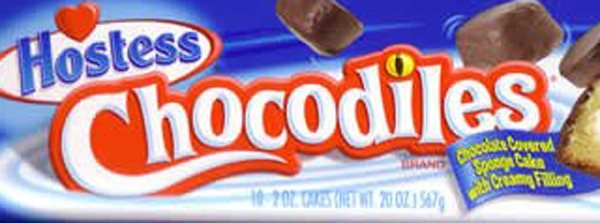
Chauncey Chocodiles
The Chauncey Chocodile character that was used for years to market the Chocodile does not even really look like a crocodile. The design of this character was always sort of brown and yellow and a bit bland and the slogan that went with him was never a big hit with consumers either. “It takes a while to eat a Chocodile” is barely even catchy. It is obvious why the slogan and the mascot were discontinued.
Perhaps it was believed that this character would take off like the Trix Rabbit, but it never did. Chocodiles were also limited for many years to a West Coast only market due to issues with the product going bad when shipped long distances, so maybe this limited effort with the mascot and branding was due to this more than anything else.
There were also some problems with political incorrectness in the original marketing campaign for this product and this is probably one of the main drivers behind removing the mascot that was problematic for the product and changing the representation of the brand.
There are many candies and sweets that have been forced to make these transformations for good reason and since Chauncey was not much beloved anyway, it was probably pretty easy for the company to part with him when there was pressure to change the way that this product was being sold. Between supply line issues and overall branding problems, it is a good thing that this product survived so that people who love chocolate and Twinkies could try it!
The boxes today are blue with pictures of the cakes floating around on the front. The classic Hostess brand badge is in the left corner with the little red heart floating above it and the Chocodiles logo only makes a small nod to Chauncey with the crocodile eyeball that forms the dot on the I. This is a much more familiar product design for the branding of the entire company’s lineup and those who love Hostess products will recognize this kind of product management much more readily than the old methods of promotion that were used for the Chocodile product.
Ingredients
This is a complex product and you have ingredients on the list for the Twinkie recipe as well as the chocolate coating:
- Sugar
- Partially Hydrogenated Oils (Palm Kernel, Coconut, Palm)
- Cocoa Processed with Alkali
- Distilled Monoglycerides
- Soy Lecithin
- Whey
- Natural and Artificial Flavor
- Water
- Enriched Bleached Wheat Flour (Flour, Reduced Iron, B Vitamins [Niacin, Thiamine Mononitrate (B1), Riboflavin (B2)], Folic Acid)
- Sugar
- Corn Syrup
- High Fructose Corn Syrup
- Partially Hydrogenated Vegetable and/or Animal Shortening (Soybean, Cottonseed and/or Canola Oil, Beef Fat)
- Mono and Diglycerides
- Polysorbate 60, Dextrose
- Contains 2 % or Less of: Dried Whole Eggs, Sugar, Modified Corn Starch, Glucose, Leavening (Sodium Acid Pyrophosphate, Baking Soda, Cornstarch, Monocalcium Phosphate), Glycerin, Salt, Sorbic Acid, Cellulose Gum, Sodium Stearoyl Lactylate, Potassium Sorbate, Xanthan Gum, Calcium Sulfate, Enzymes, Yellow 5, Red 40 and Wheat Flour.
The safety warnings for allergens include soy, milk, wheat, and egg. Despite being accused of not being a real food item once upon a time, this product clearly meets too many food group allergen lists to be safe for anyone with food limitations. This is not the treat for those who adhere to specific diets or those with common food allergies.
Nutrition
| Serving Size: | 1 cake (41g) | % Daily Value* |
| Amount Per Serving | ||
| Calories | 169 | |
| Total Fat | 6.5g | 10% |
| Saturated Fat | 3.1g | 16% |
| Trans Fat | 0.5g | |
| Polyunsaturated Fat | 0.7g | |
| Monounsaturated Fat | 2.2g | |
| Cholesterol | 15mg | 5% |
| Sodium | 154mg | 6% |
| Total Carbohydrates | 26g | 9% |
| Dietary Fiber | 0.7g | 3% |
| Sugars | 17g | |
| Protein | 1.8g | |
| Vitamin D | 0mcg | 0% |
| Calcium | 26mg | 2% |
| Iron | 1mg | 4% |
| Potassium | 59mg | 1% |
| Caffeine | 2mg |
- The % Daily Value (DV) tells you how much a nutrient in a serving of food contributes to a daily diet. 2000 calories a day is used for general nutrition advice.
Pictures
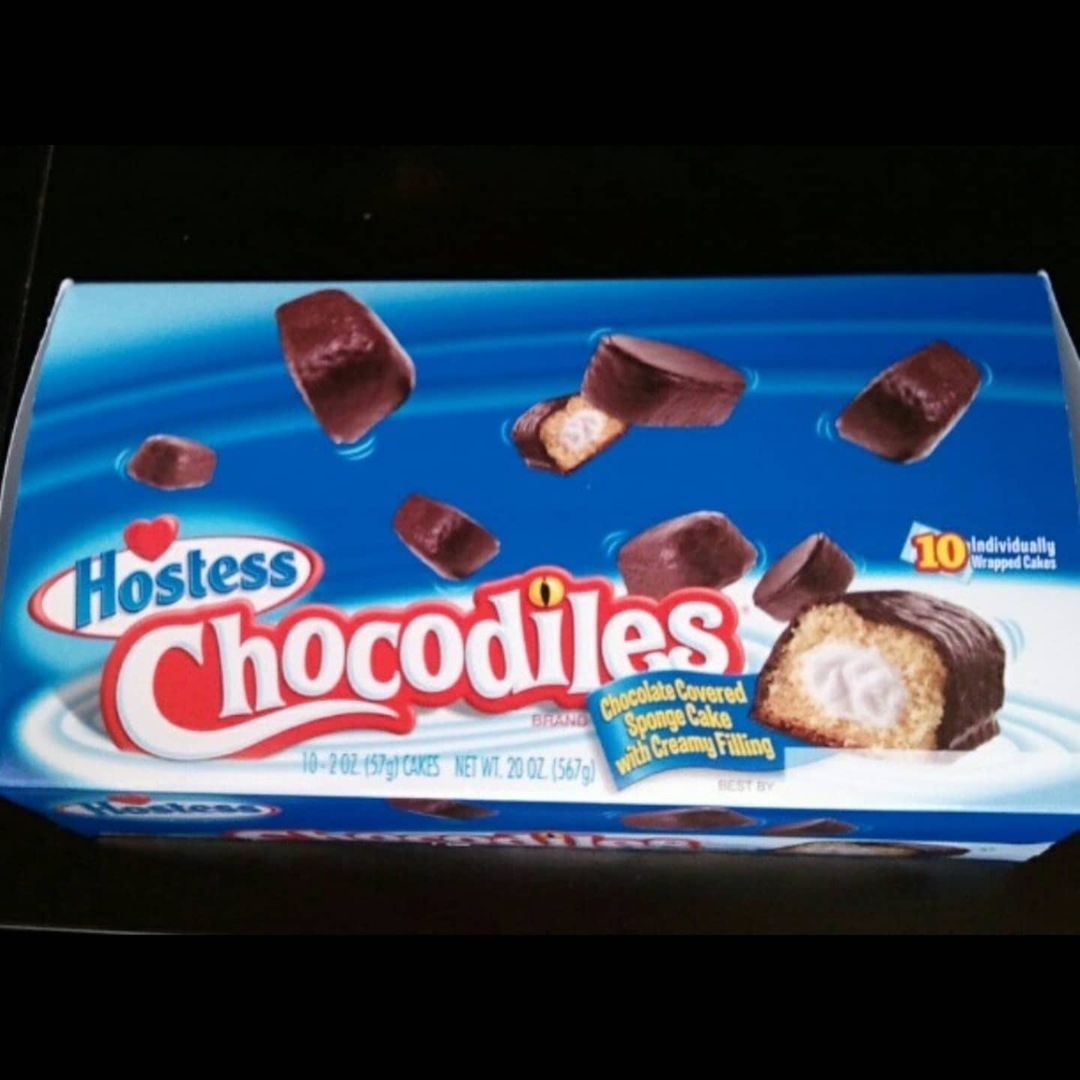
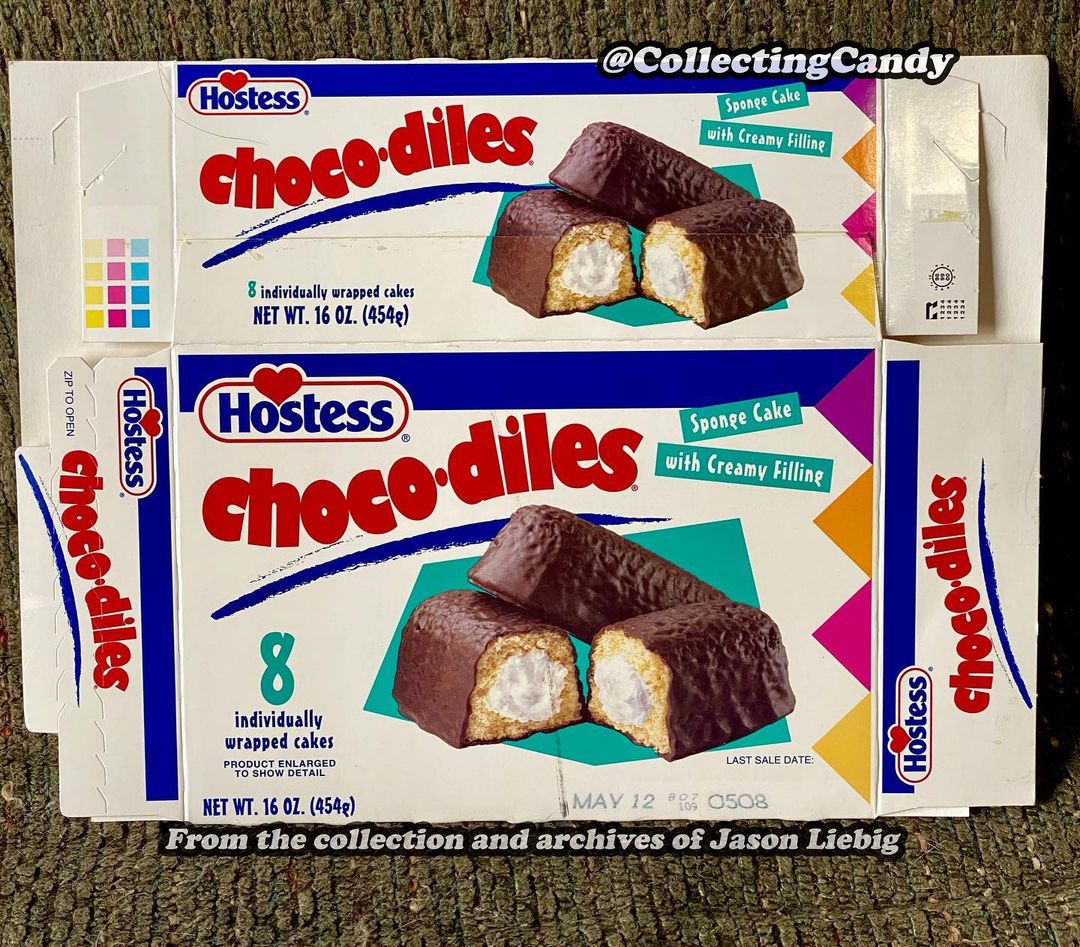
Commercials
A classic ad with political incorrectness issues that are linked to the removal of the Chauncey character:
Another vintage ad:
A taste test:

My name is Brianna and I love writing on all topics. Candy history fascinates me and I am passionate about sharing my love of this topic with everyone else!
Please leave a review or any memories of this snack in the comments below. Thank you!
Click here for a full A-Z list of Snacks and Candy
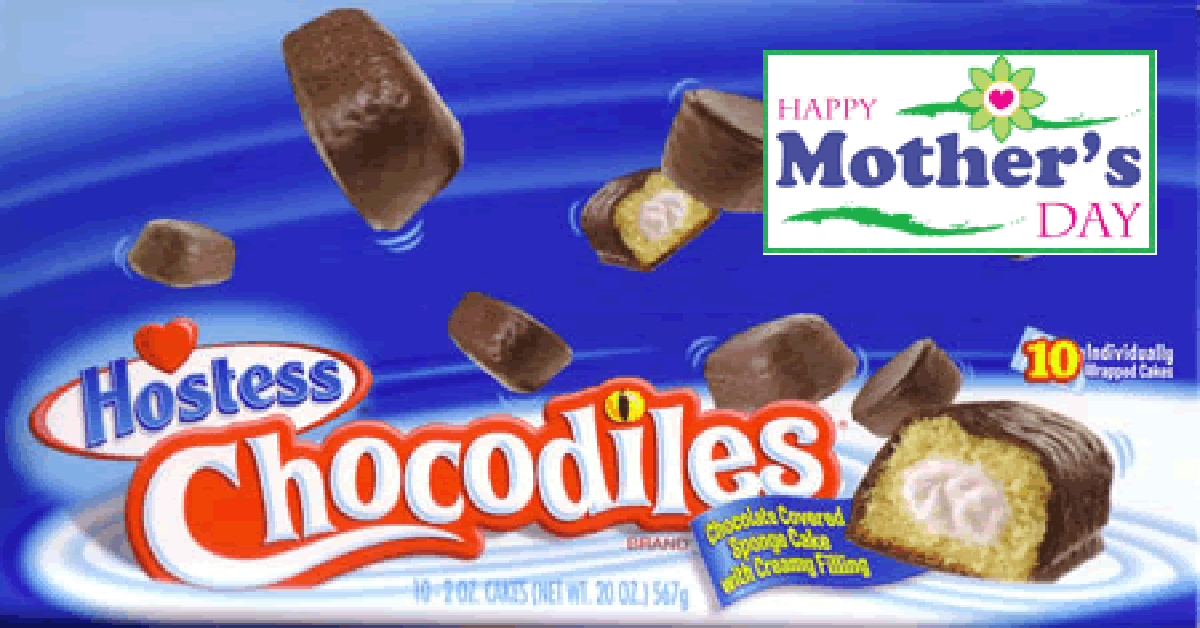
Yes but WHEN were they first created?
Bring back Chocodiles